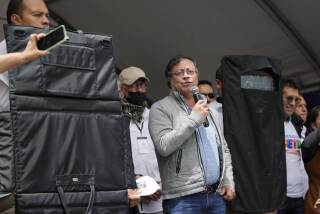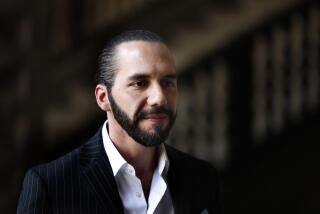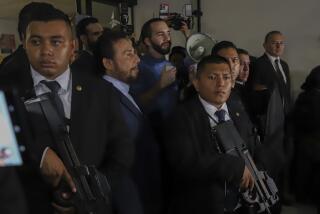Colombia Congress OKs referendum on Uribe seeking reelection
BOGOTA, COLOMBIA — Colombian President Alvaro Uribe has cleared the last legislative hurdle to running for a third term, a prospect that his U.S. allies look upon with ambivalence.
By a vote of 85 to 5, the lower house of Congress late Tuesday greenlighted a voter referendum early next year that could pave the way for Uribe to be on the May presidential ballot. The Senate approved the measure last month.
If he does run, it would be the second time Uribe has circumvented a constitutional ban on reelection, a measure many Latin American countries put into law to prevent the ascension of caudillos, or political leaders who have kept themselves in power.
First elected in 2002, Uribe was reelected in a landslide in 2006 after Congress authorized a similar referendum to change the 1991 constitution, which limited presidents to one term.
In recent interviews, U.S. officials have acknowledged that they were not enthusiastic about an ally following a path taken by leftist leaders across South America, including Venezuela’s Hugo Chavez, Ecuador’s Rafael Correa and Nicaragua’s Daniel Ortega, who have secured reelection, or are trying to, despite constitutional restrictions.
U.S. officials believe such efforts to cling to power weaken political institutions.
However, State Department and congressional officials, speaking off the record because they were not authorized to speak publicly, said another Uribe candidacy probably would not affect U.S. anti-drug and counter-terrorism assistance to Colombia. Such aid has cost the U.S. more than $6 billion since 2000.
Uribe would be a clear front-runner in the next presidential election. Citizens from a broad spectrum of political and economic backgrounds credit him with restoring security to urban areas and highways, demobilizing right-wing paramilitary groups and seizing the battlefield initiative from the leftist Revolutionary Armed Forces of Colombia, or FARC.
For most of his two terms, Uribe has enjoyed voter approval between 60% and 80%, according to Gallup polls. His popularity peaked in the summer of 2008 after Colombian commandos rescued 15 hostages held by FARC rebels, including onetime presidential candidate Ingrid Betancourt and three U.S. defense contractors.
“Uribe has changed the spirit and the reality of our nation,” said lawmaker Nicolas Uribe Rueda, who voted for the referendum. He is not related to President Uribe. “With four more years, he will have the chance to finally defeat the guerrillas and the paramilitaries.”
Alfredo Rangel of the Bogota-based think tank Security and Democracy Foundation said Uribe transformed a country that in 2002 was on its heels and whose capital was at risk of a FARC assault.
“His leadership has been strong and effective, the application of his policies has been very positive, and I think it’s important we maintain that,” Rangel said. “Constitutions are not untouchable, dead documents.”
But Ana Maria Bejarano, a University of Toronto political science professor, said the authorization of the referendum was a “sad day for my country” because it opens the door to future caudillos and the destruction of Colombia’s legal checks and balances.
“The 1991 constitution not only outlawed reelection but, in assuming a one-term president, carefully designed a system with countervailing powers,” Bejarano said. “Now all these mechanisms to check his power will be worthless and won’t work anymore.”
An opposition lawmaker, Sen. Gloria Inez Ramirez, said the congressional vote orchestrated by Uribe supporters was a “depressing spectacle” involving promises of lavish government spending in the congressional districts of pro-referendum members.
“This is a blow to the rule of law in our country,” Ramirez said.
Uribe’s bid is not assured success. First he must win approval for the referendum from the Constitutional Court. Then the measure must generate adequate turnout; Uribe must collect a majority with no fewer than 7.5 million votes cast, accounting for a quarter of the electorate.
And finally, Uribe must choose to run, a decision he has agonized over in public for months, keeping the Colombian political system in a state of suspended animation as it gears up for next year’s vote.
More to Read
Sign up for Essential California
The most important California stories and recommendations in your inbox every morning.
You may occasionally receive promotional content from the Los Angeles Times.









